Angola: Climate resilience
Widespread improvements in the quality of life of many of the world’s populations have gone together with increased demands on natural resources. The planet is struggling to keep up, with increases in the average global temperature and the frequency of extreme weather events transforming ecosystems worldwide. Moreover, climate change impacts the world’s vulnerable people the most, many of whom lack the resources to adapt to new climate realities.
Agriculture is a source of livelihood for millions of Angolans. However, due to decades of war, whole generations have forgotten basic farming skills. This means they know how to grow only a limited range of crops and hunt in the forest for meat, so they do not reach the full nutritional and financial potential of their work. For this reason, our projects introduce the people to new ways of producing, processing, and selling their crops.
Our main areas of focus are:
Climate resilient food and livelihood systems: here, we take a systems approach to livelihoods to improve food and nutrition security in climate-change vulnerable areas. This approach means analysing the root causes of poverty and nutrition insecurity, using a gender lens to identify the challenges the target group faces, and using a participatory process to identify opportunities and potential solutions. Approaches within this thematic area may include support to diversify livelihoods, such as food processing and marketing, debt relief and establishing links with social protection services, and supporting existing agricultural livelihoods.
Climate resilient WASH: here, technological solutions in climate-change vulnerable (e.g. drought- and flood-prone) areas are supported through enhanced governance and service-provider accountability. The key components of this approach are climate vulnerability assessments incorporating an analysis of GESI dynamics, the application of PIN’s Standards of WASH Programming and the participatory selection of appropriate climate-resilient solutions.
Productive and climate resilient landscapes: here, we address environmental degradation and the climate change-induced changes to the land, water and other resources people depend on for such things as agricultural productivity. Analysing geohazards alongside existing agricultural and livelihood practices is essential to providing a holistic solution that protects communities from the impact of natural disasters. It enhances agricultural productivity, livelihoods, and food security. Our response within this thematic area engages all key stakeholders, and our approaches include Early Warning Systems, Climate Smart Agriculture and Natural Resource Management techniques.
Past aid programmes

Multi-sectoral emergency assistance to vulnerable populations affected by the conflict
PIN focuses on communities in Lemera and Nyangezi where we provide life-saving assistance through different types of activities. Thanks to the cashdistribution, the most vulnerable households are able to cover their basic needs.. Rehabilitation of water points and distribution networks will ensure access to safe water, which is crucial for preventing the spread of water-borne diseases and malnutrition. Besides, PIN provides supervision to the health care staff, and trains doctors and nurses in quality treatment. Health centers are equipped with essential medicine and pharmaceutics so they are able to provide holistic and systematic care to patients suffering from common diseases (e.g. malaria, diarrhea, dehydration, pneumonia). Community awareness campaigns are focusing on caregivers, mostly women, by conducting cooking demonstrations using local high-nutrient-rich food important for good growth and development of children. Community volunteers are regularly visiting communities helping to identify malnutrition cases, and sharing information on hygiene and nutrition practices.

Women Entrepreneurs / Mulheres empreendedoras
Beneficiaries of this initiatives are mainly local women. Thus, at least 50 women´s group supported as part of the business development program, at least 10 women´s groups supported with a grant and a consultancy service to develop or build their business and at least 1000 women with informal employment targeted by the awareness campaign. In addition, there will be provided training of advocacy groups and community agents, awareness campaign and community workshops.

Integrated approach to improve nutrition in the first 1000 days
Since 2011, PIN has been promoting a Community-Led Total Sanitation (CLTS) program together with UNICEF in Angola. This approach is based on the use of participatory tools and methods for communities to reflect on their health situation, particularly on the impact of Open Defecation (OD) on health status and the environment.
In this new phase, the focus will be based on the supervision of recently triggered villages in Bié, with reinforcement of the teams from other municipalities who are ahead with CLTS programming, such as C4D (Communication for Development) at community level. Emphasis will be on adapting appropriate nutrition-related activities, its accompaniment and further data-collection. These activities will include the UNICEF-led distribution of supplement of the diets of children aged 6-23 months such as micronutrient powders and supporting pregnant and lactating women with infant and young child feeding counselling as well referral for the treatment of severe acute malnutrition. PIN, implementing the WASH and Nutrition-related activities will closely follow the work done by UNICEF and work together with local Health Units and authorities on data collection.
Through its focus, the project will create, strengthen and capacitate the tools of CLTS to the municipal commission (CMSDAL), namely through the involvement of a greater number of its technical staff carrying out specific monitoring activities, creating the basis for effective operationalization of the CMSDAL (given that CMSDAL is the only entity entitled to make follow-ups and motivate the villages in the municipality). At the same time, PIN will focus on working together with the social mobilizers selected from their villages, which is intended to make it possible to continue the program and to promote an expansion in terms of size and type of actions within CLTS programming at community level.

Integrated Support to the Water and Nutrition Sector in Namibe
Limited access to water severely limits food production. Therefore, the affected families are dependent on emergency food supplies provided by the government. As a result of the lack of water and food availability, hygiene conditions and practices deteriorate and, together with the lack of food diversity, are leading to high levels of malnutrition in the province.
The action is implemented jointly by PIN and ASD - Action for Solidarity and Development (Acção de Solidariedade e Desenvolvimento) and aims to improve the resilience and nutritional status of drought prone agricultural and pastoralist communities prone to drought in the municipalities of Moçâmedes and Camacuio. In order to respond to the main problems described above the proposed action aims to achieve the following: increase the capacity and use of drinking water sources and improve access to drinking water for human consumption and food processing, increase the capacity of water sources and improve access to water for irrigation and livestock, establish clear management and technical institutional systems for existing and newly established water sources used for both agriculture and human consumption, and finally improve skills, capacity and awareness of good hygiene and nutrition practices among local community members and of the local community and nutrition stakeholders to prevent and respond to cases of malnutrition.
However, access to water is affecting men and women differently. In the target communities, women and girls are responsible for collecting water for their households. Due to the drought, the time and distances to collect water are even more difficult. Most of the men are herders and are migrating with their cattle to other provinces less affected by the drought, leaving women with limited resources and dependent on emergency food supplies.
According to the EU National Gender Profile for Angola, women are also not sufficiently empowered to participate in community decision-making processes. To mitigate this problem, the proposed action conducts the community participatory process in the design of Natural Resource Management Plans, during which input from men and women is collected separately. PIN and its Angolan partner ASD encourage women to participate in all Cash for Work (CfW) activities, to provide temporary work and income during the herder migration season. Since women are more likely to spend their income on food and health expenses for their children, this contribute significantly to improving the nutritional outcomes of the target communities. In order to promote the participation of women with young children, CfW sites will provide facilities for child care and will include awareness raising on nutrition and hygiene.
Overall, at least 15,260 people will benefit from improved access to water in the target areas, including pastoralists, farmers and at least 13,080 people will benefit from improved knowledge about nutrition and hygiene practices including households with children under 5, pregnant and lactating women, health system employees and members of local authorities.

Towards an independent and resilient management of Community-Led Total Sanitation
Building upon our long-term work in the area of water, sanitation, and hygiene (WASH) in the Bié Province of Angola, this project is using a proven Community-Led Total Sanitation (CLTS) approach, a participation method in which the communities themselves are responsible for their own sanitation. Along with building latrines, communities work on maintaining good hygiene practices (such as handwashing and maintaining Open Defecation Free areas) through the work of local social mobilizers.
One of the main principles of the CLTS approach is ensuring the sustainability of these positive changes. To achieve this, PIN works with provincial and municipal committees responsible for the programme and supports them in planning, budgeting, and overseeing the newly built facilities and the CLTS programme. Special attention is paid to latrines and handwashing facilities in schools and health centers. PIN now supports 169 villages in four additional municipalities of the Bié Province: Kuito, Catabola, Camacupa, and Chinguar.
Moreover, in the 6th phase of the project, PIN also strives to improve awareness and positive attitudes on menstrual hygiene and to improve nutrition awareness and education in the target municipalities. The project will also respond to the Covid-19 pandemic: coordinated with UNICEF and the Ministry of Health, activities will include raising awareness on hygiene and protection and distributing hygiene kits with soap, water purification tablets, etc. PIN will closely cooperate with local women groups that will be trained in the production of hand-made face masks and sanitary pads.
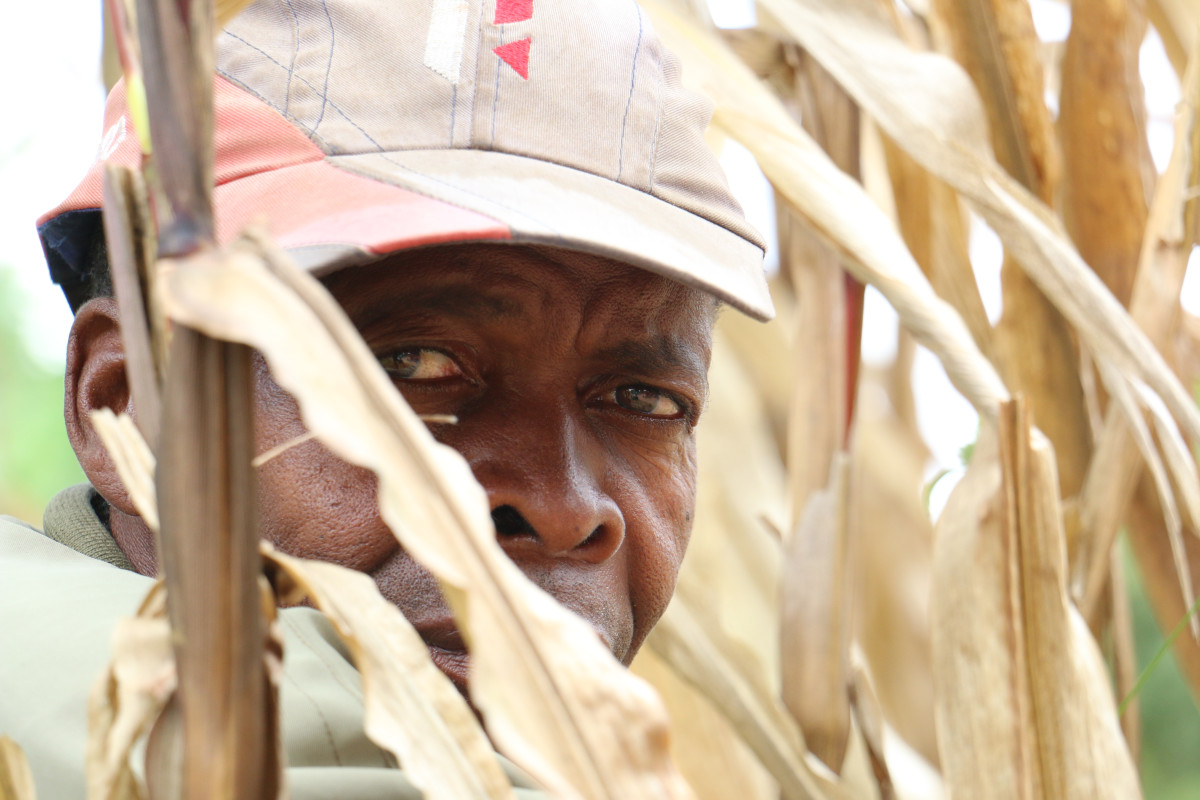
Chitanda: Resilient agriculture systems to improve food and nutritional security
The project Chitanda (a word in Umbundu language meaning ‘market’ or ‘market product’), implemented in partnership with the local NGO ASD (Solidarity and Development Action), addresses these key challenges through a number of integrated actions.
We organise trainings to technicians from governmental institutions in order to strengthen their knowledge and share approaches to innovations in agricultural techniques. In order to increase the production capacities of small-scale farmers, we support Farmer Field Schools designed to improve their knowledge and skills on innovative good agriculture practices and climate-smart farming methods, including trainings on topics like land preparation, soil fertility, sowing and planting, harvest. In addition to theoretical and practical trainings, we distribute kits to the farmers composed of tools, seeds and plantation materials, fertilizers and other equipment, such as wheelbarrows, shovels, strings, fencing or seedlings. Demonstration plots are selected among vulnerable farmers to present climate-smart agriculture techniques, including agroforestry, intercropping, conservation agriculture and gravity irrigation. As a way to share experiences, Farmer Field Days are organised in the beginning of the season and after the harvest.
Small and medium enterprises, self-help groups and community-based organisations are also a part of the project. We introduce improved agriculture processing technologies among those, allowing smallholders to transform their production locally and sell at a higher price. At the same time, we support self-help groups and community-based organisations in developing small businesses around these processing technologies. Exposure visits for small producers and cooperatives are also held in order to improve cooperation in sales.
With regard to nutrition, we organise workshops for nutrition specialists and voluntary health workers on topics like causes of malnutrition, transmission paths of diarrheal disease, and good infant and young child feeding. Community Health Days are organised to raise awareness on good nutrition practices among the local population.
Throughout a period of 30 months, the project intends to aid more than 540 small-scale farmers and horticulturalists, 40 health system staff, 24 government staff from the agriculture offices, 15 small and medium enterprises, 80 market actors and 900 women that are pregnant or with children under the age of five.

Increasing access to safe water through manual drilling and improved water management
V návaznosti na sanitární projekty, které Člověk v tísni v provincii dlouhodobě realizuje, se projekt zaměřoval na přístup k bezpečným zdrojům vody v 18 vybraných komunitách s přibližně 9000 obyvateli. Na výstavbu nových a rehabilitaci předtím nefunkčních studní se použila inovativní technologie ručních vrtů. Kromě toho byla komunitám poskytnuta ruční čerpadla.
Aby byla zajištěna udržitelnost projektu, dalším krokem bylo zlepšení schopnosti místních samospráv a komunit provádět manuálně vrty a spravovat vodní zdroje. S tímto cílem byla konstrukce a rekonstrukce studní doprovázená mobilizací na komunitní úrovni. V každé zapojené komunitě byla vytvořena komise, jejíž členové absolvovali školení o technické a finanční správě vodních zdrojů, včetně přednášek o prevenci znečištění a správných hygienických a sanitačních praktikách.

Community led total sanitation / Promotion of hygiene in rural areas
This initiative focuses on encouraging a change in sanitation behaviour rather than merely constructing toilets. It is a zero subsidy approach that aims to motivate communities to improve their own sanitation situation through a process of social awakening that is stimulated by facilitators (social mobilizers) from within or outside the community.
PIN works to consolidate and expand the experience of Nharea municipality, where CLTS programme was officially endorsed by the local administration and implemented with dedicated budget and human resources. As a result, Nharea community was declared the first in Angola to achieve the status of Open Defecation Free (ODF). PIN now supports four other municipalities of the province and provincial commissions responsible for the programme to plan, budget and oversee the execution of the CLTS agenda.
The project is also focused on encouraging ODF communities to move further in the improvement of their hygiene and sanitation conditions. This is done through an incentive system created to promote small but meaningful changes such as the construction of pit lids for latrines and basic devices for hand washing. The improvement of sanitary conditions in ODF villages is an action that PIN develops with the support of municipal teams and community health agents.
In addition, the programme also works to improve hygiene and sanitation conditions and good practices in schools and to increase the capacity of schools’ administrations to put in place SLTS - School Led Total Sanitation. Teachers are also trained to promote hygiene and sanitation at schools, with parent’s support, so that students are encouraged to get involved in the activities and engaged in the topics discussed.

Sending life-saving messages to mothers and caregivers
The mobile health (M-Health) project implemented by PIN is the only one of its kind in Angola. PIN started piloting it in 2015, and the good results and positive feedback from the users led to the extension of the project.
With the aim of contributing to the improvement of newborn and maternal health in Angola, M-Health uses voice messaging technology to overcome illiteracy barriers and provide timely information that supports new mothers and fathers in providing the best possible start to their child’s life. During the first 6 months of a child’s life, the service automatically delivers two messages per week to registered mobile phones with information on breastfeeding and infant nutrition, vaccinations, recognizing and responding to baby sickness, childcare and child development, good hygiene practices, maternal health, and other topics. The topics of the messages are scheduled to suit the stage of growth of the child.
The voice messages are entertaining conversations read by local actors that have created culturally appropriate characters, providing an enjoyable service, effective at changing behaviours. According to a monitoring on the impact of the project’s pilot phase, 93% of users learnt something new, and 97% would recommend the service to others.
Training of traditional birth attendants (TBAs) in safe delivery practices and neonatal care is also a part of the project. The project creates links among mothers, TBAs and health staff and reinforces newborn care capacities on different levels. Priority is given to communities with high neonatal mortality and high proportion of women in fertile age. About 13,000 users have already received support and more than 700 TBAs have been trained in the rural and peri-urban areas of the selected municipalities.
In its second phase (2019-2022), and in cooperation with the local authorities, the project aims to expand its voice messaging beyond the first 6 months of a child’s life by creating two new message packs to cover the period of a woman’s pregnancy and of the first 7-24 months of a child’s life. The project also expands its scope by creating voice messages in more national languages and cooperating with more health centers. In order to reach more vulnerable women outside of health centers, TBAs will be involved in the registration process. In addition, local health technicians will receive training in administering the voice messaging system to ensure the project’s sustainability.
As a part of the project’s response to the 2020 Coronavirus outbreak, PIN has prepared special voice messages on the prevention of the spread of the virus.
After 4 years of the Mobile Health project in Bié, Huíla and Huambo Provinces, PIN will continue the implementation in the period 2022-2023 with the financial and technical support of UNITEL. PIN wants to adapt the project considering the health challenges faced by the supported communities, the lessons learned throughout the implementation of this project and the identified advocacy needs. An advocacy strategy will be therefore developed in conjunction with UNITEL to integrate the methodology of the Mobile Health project into the health promotion activities of the Public Health services with actions at regional and national levels.
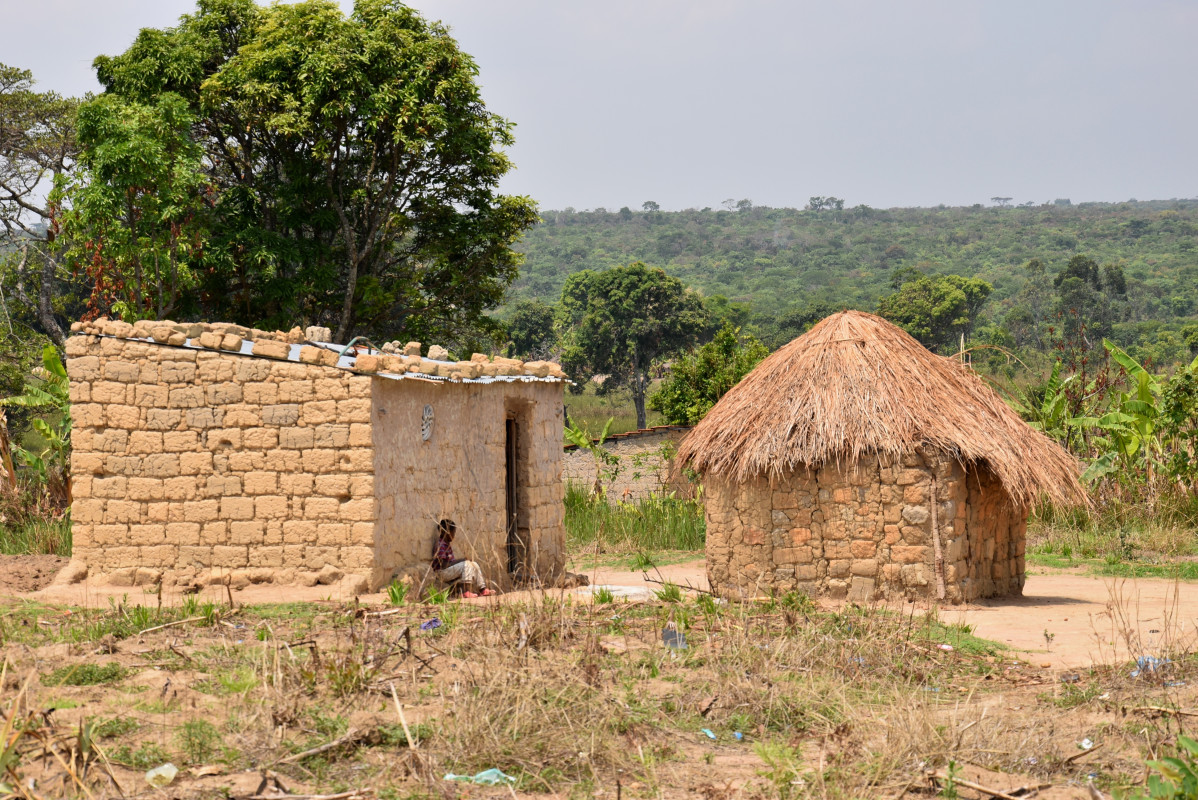
Food and nutrition security improvement
PIN provides beneficiaries with practical trainings and continuous advisory support, as well as relevant agriculture inputs. The supply of seeds of highly nutritive crops like soybean, groundnut, sweet potato and fruit trees is part of the project, that also fosters the implementation of vegetable-gardens and new irrigation systems, and the production of organic fertilizer. The initiative also promotes better practices for duck breeding and distributes cattle in Bié province, where the presence of bovine is very small.
As a result of the rise in the agricultural production, the workforce demand in the selected villages should also increase. PIN also encourages cooperative work of women and gives support in terms of income generation activities.
The nutrition component focuses on improving the dietary patterns of children and young women through training courses and campaigns on how to cook nutrient-rich food, the importance of breastfeeding, and safe hygiene practices. The nutrition work is expected to enhance the access to nutrient rich food in the target areas. In total, 3,000 households benefit from the project.
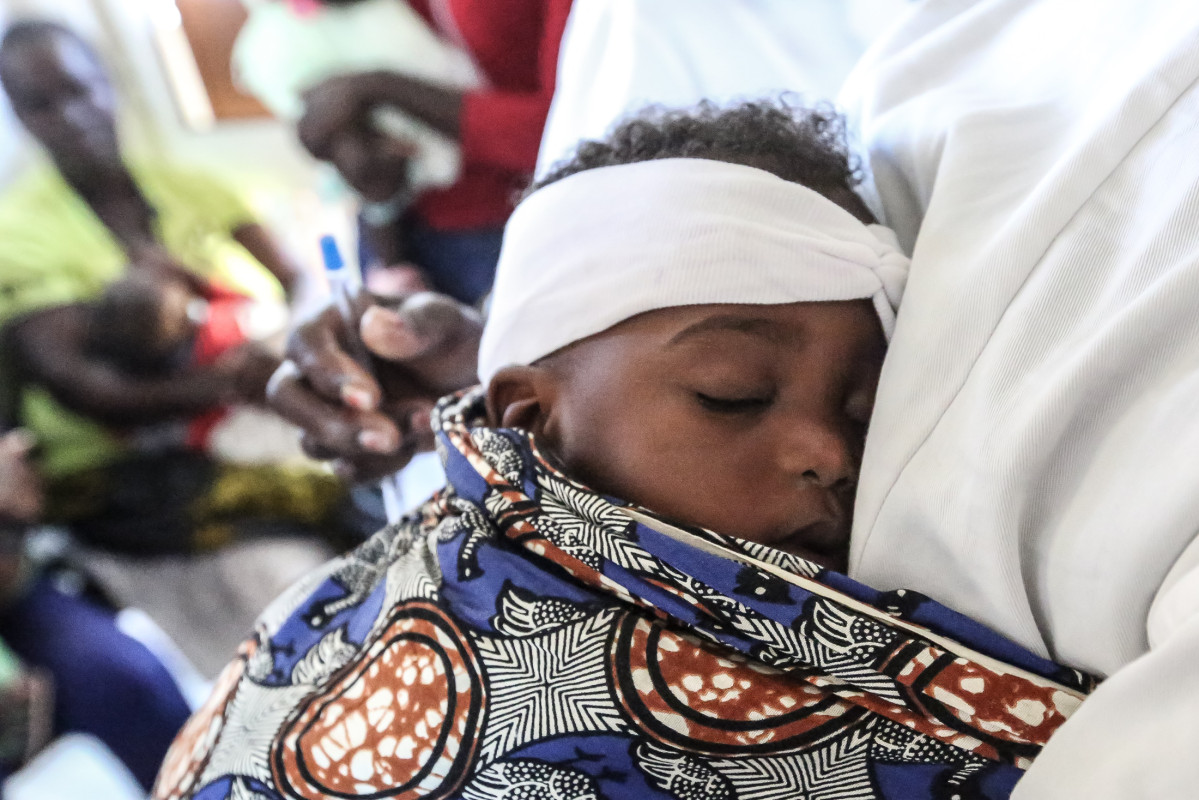
IPIN – Integrated Programming for Improved Nutrition
The project is focused on the sustainable reduction of mother and child malnutrition integrating activities from three sectors: water, sanitation and hygiene, health and nutrition. The main objective is to improve maternal and child care practices influencing the nutrition and health status of pregnant and lactating women and children, through the mobilization of existing community and public resources in selected villages.
Nutrition component aims at improving the rate of infants under 6 months that receive exclusive breastfeeding. TBAs (Traditional Birth Attendants) are trained to transfer knowledge and good practices to mothers and caretakers. TBAs activities are complemented by behavioural change communication campaigns. In selected communities, support groups are formed for sharing experience between pregnant women, mothers and caretakers.
Water, sanitation and hygiene is the core of the project, since it is based on PIN expertise in open defecation free (ODF) villages in Bié province. The beneficiaries of the project were selected among 30 ODF villages in two municipalities. This component promotes the adoption of appropriate practices to avoid children’s contamination by domestic animal faeces – very often, children are left unattended, crawling on the ground, surrounded by chickens, goats or even pigs –through the use of physical barriers and the rising of awareness among inhabitants on the danger of ingesting animal faeces. The solution should be sustainable and adopted at household levels with the support of community health agents and other community change agents.
Health pursues the objective of having children under 2 years old and pregnant women vaccinated and receiving necessary supplements through outreach service provided in cooperation with authorities of the health sector. People in Need provides logistical support and training to health facilities and staff in project areas in order to reduce stock ruptures of vaccines and micronutrient supplements.

Safe water for rural communities
It has been proven that access to safe drinking water leads to decreased prevalence of diarrhoea and other water-borne diseases which cause high level of child mortality, as well as other detrimental effects on the lives of children (e.g. limited absorption of nutrients, prolonged absence from school, etc.). PIN’s project aims at strengthening water hygiene and sanitation standards in rural communities.
This is achieved by rehabilitating old water points and drilling new wells employing innovative low cost drilling technology. The work is done jointly with the support of the Municipal Administrations who deploy a focal point and a technical team to be trained on the job. Workshops are organized in communities to promote hygiene and sanitation standards, including water treatment and hand washing habits.
Each village nominates a “water committee” that is responsible for managing the water points and sensitizing dwellers on hygiene promotion. PIN stimulates communitarian ownership of the project, through beneficiaries’ personal and financial involvement in the committees, as a crucial factor for its sustainability. A supply chain of materials and spare parts for water and sanitation is promoted with the involvement of the private sector, to overcome the lack of spare parts for repairs at local level.
Over 84 000 people in rural area of Bié, Huíla and Benguela provinces will directly benefit from the project. The work is developed in 210 communities, in 6 municipalities.

Food and nutrition security improvement
People in Need works to improve long-term food and nutrition security in Angola, through a project that integrates both agricultural and nutrition sectors. The agricultural component aims at increasing and diversifying crop production and raising small farmer’s income.
PIN provides beneficiaries with practical trainings and continuous advisory support, as well as relevant agriculture inputs. The supply of seeds of highly nutritive crops like soybean, groundnut, sweet potato and fruit trees is part of the project, that also fosters the implementation of vegetable-gardens and new irrigation systems, and the production of organic fertilizer. The initiative also promotes better practices for duck breeding and distributes cattle in Bié province, where the presence of bovine is very small.
As a result of the rise in the agricultural production, the workforce demand in the selected villages should also increase. PIN also encourages cooperative work of women and gives support in terms of income generation activities.
The nutrition component focuses on improving the dietary patterns of children and young women through training courses and campaigns on how to cook nutrient-rich food, the importance of breastfeeding, and safe hygiene practices. The nutrition work is expected to enhance the access to nutrient rich food in the target areas.
In total, 3,000 households will benefit from the project.

Fighting child malnutrition
In five regions of the Bié province, PIN has coordinated community programs dedicated to combating child malnutrition. We have trained 560 community health volunteers in the villages on how to identify child malnutrition and how to properly treat it. We have examined 300 000 children, and more than 40 000 malnurished kids have received treatment thanks to the provided protein supplment feeding. On a weekly or bi-weekly basis, children were checked for case of complications or lack of improvement, and if any problems arose, they were reffered to the Health center unit for malnutrition.
Also, we have taught parents about hygine and nutrition habits so that they can help prevent malnutirtion in their households.
Before the end of 2013, at the end of the program, we managed to persuade local goverment to independently continue the program. We have helped them prepare budgets and now, in 2014, we support them in effective cooperation with the community health volunteers. We teach both the officials and the volunteers how to gather data and report and analyse it. The role of the suprevisors is to provide assistance and support to the volunteers. In schools, we also train the teachers about malnutirtion prevention and essential good habits which are later transfered to the children. In the communites, we organise demonstrative cooking classes.
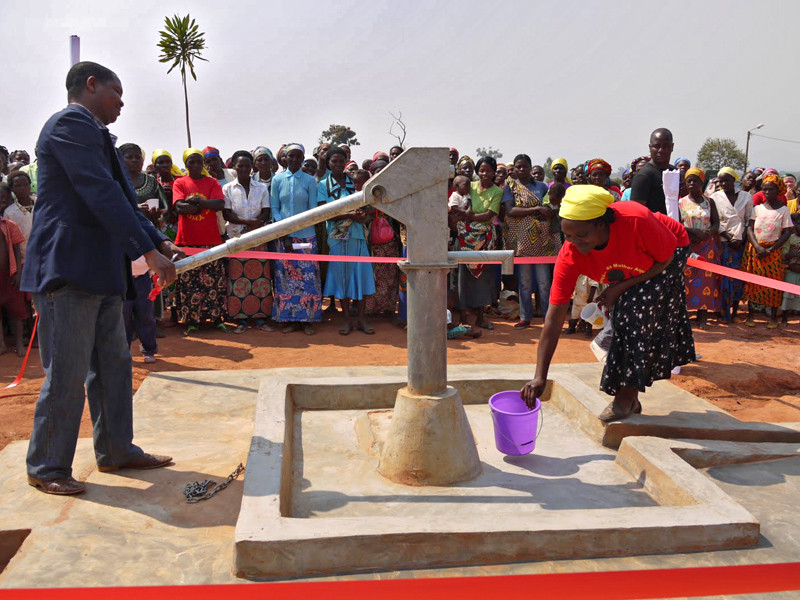
Construction of wells and waste management
In the region of Andulo, which is in the province Bie, PIN residents participated by building five wells in the villages.The organization focuses on repairing existing water resources and especially trying to carry out the management of locals and water authorities through caucuses. In the communities, they are implementing administrative systems where citizens can contribute to the repair fund from fees for the use of wells. Educational activities aim to encourage people to use drinking water, even if it has a fee.
People in Need also supports the expansion of the market for spare parts for wells and other hygiene aids. It tries to combine the mutual supply and demand of the population and local authorities, on the one hand and the retail and wholesale businesses on the other. In addition, the organization develops innovative designed hand pumps, which can be built from cheap and locally available materials and components.In collaboration with residents and town government of Cuemba, People in Need has built an ecological landfill and municipal waste collection points. At the same time they have trained a local waste management company to manage the whole system of hazardous waste management. Residents, students and farmers have developed ways to handle the secondary waste and composted.
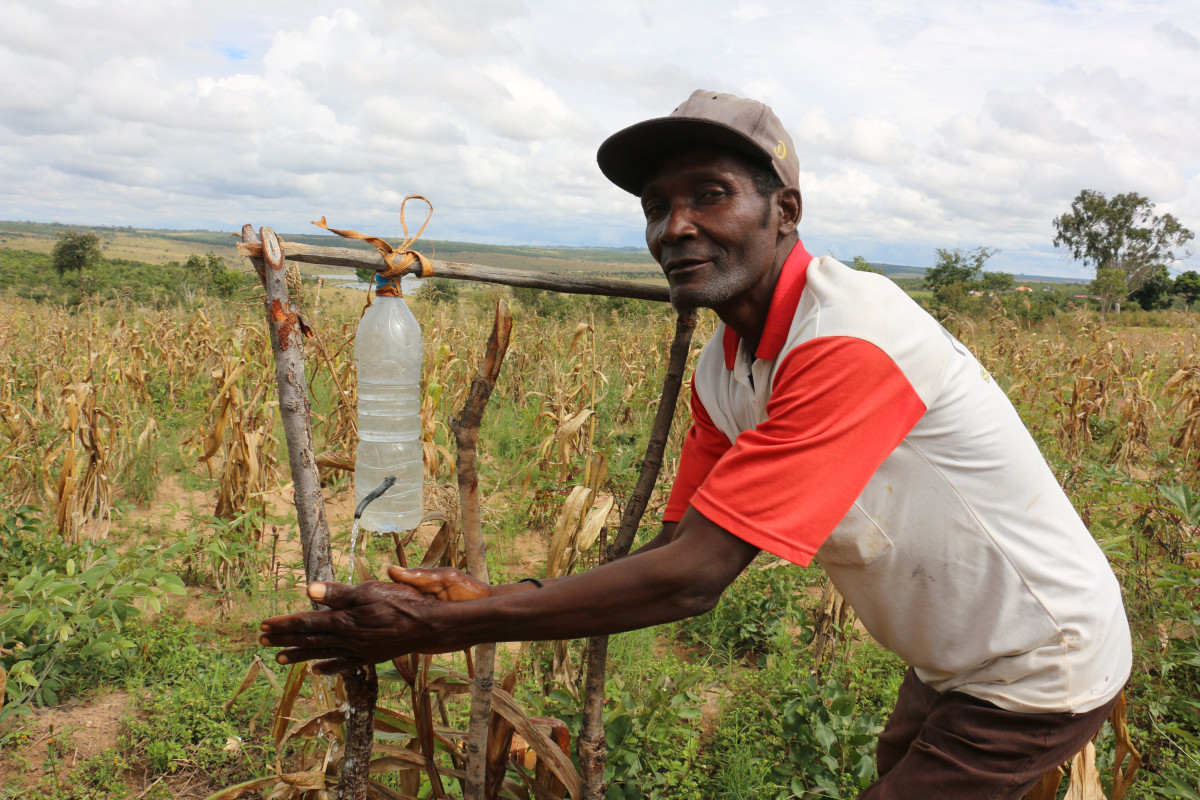
Hygiene education in rural areas
The most common diseases in Angola are those whose risk can be greatly reduced by practicing basic hygiene habits and improving access to drinking water. Therefore, People in Need has trained hundreds of villagers, health volunteers, teachers and pupils in the five regions of the Bie province in basic hygiene.
We use simple participation methods, such as PHAST or CLTS, that provide people with information and new skills while simultaneously motivating them. For example, we show them how much money they spend on medical treaments, how many crops they’ll loose if they stay home sick instead of going to work in the fields, and the fact that because they don’t use latrines, they transmit their neighbors excretions into their homes, food and water. These educational methods successfully motivate individuals and communities to build their own latrines, treat drinking water, and care about the cleanliness and health of the whole family.
130,000 people from 230 villages have already taken and passed the hygiene and sanitation awareness sessions. As a result, half of them have built their own latrine, have begun to wash their hands and have been observing other basic habits.
At the same time, we are trying to expand the local market and increass access to basic sanitation and hygiene materials such as concrete slabs for latrines, construction materials, soap, disinfectant, spareparts for repairing pumps etc.
Farmer training and Agricultural Market development
800 farmers successfully passed the courses and expanded and enriched their own production thanks to the provision of small grants. During the training, they learned basic agricultural techniques such as crop rotation, fertilization, pest prevention and cultivation of new crops. They also learned how to take care of poultry and livestock and prevent animal diseases. Thanks to the training, their own crops increased two to three-fold. Their families and communities now have access to a nutritionally enriched diet, including protein, and have increased the income and the health status of their whole family.
Similarly, within their communities in the rural farm schools, a thousand farmers are taught by PIN trainers and extention workers. The Farmers Field Schools offer illiterate or little educated residents simple techniques and visual practical learning on training plots, where several approaches can be tried and evaluated. They also learn to take care of goats, chickens or bees, and test their own skills thanks to loans that are provided in the form of seeds, tools and livestock. In the future, the most successful Farmers Field School can obtain a larger community grant, such as a plow or water power plant
Additionally, women learn how to grow medicinal herbs, which are often the only available medication for the rural communities.
The Agrarian center, sample farm set by PIN, offers the residents of Cuemba a number of services including a small mill, a shop with agrarian inputs, a tractor rental and other machinery, etc. The Agrarian center also buys produce from farmers in addition to selling its own.Moreover, the center runs a bakery and provides around 4000 loaves of bread on a daily basis to the residents of the town.
We also support the organization of village markets, linking urban merchants and rural farmers. Farmers buy agricultural inputs such as tools, boots, fertilisers or seeds, and merchants buy their produce and sell it back in the towns.





